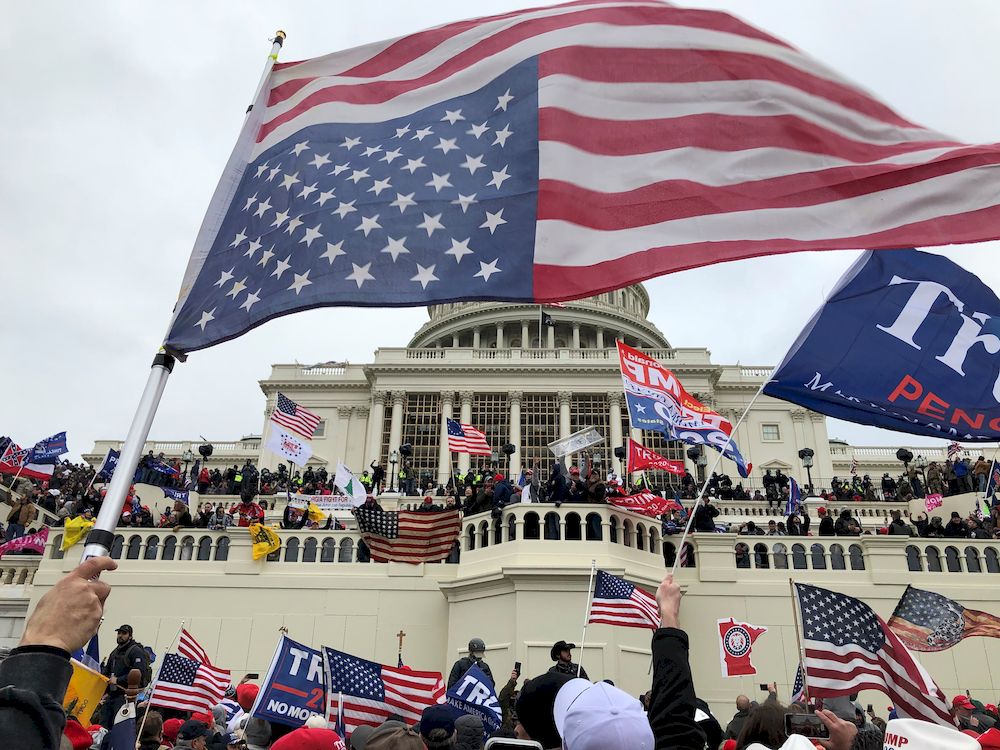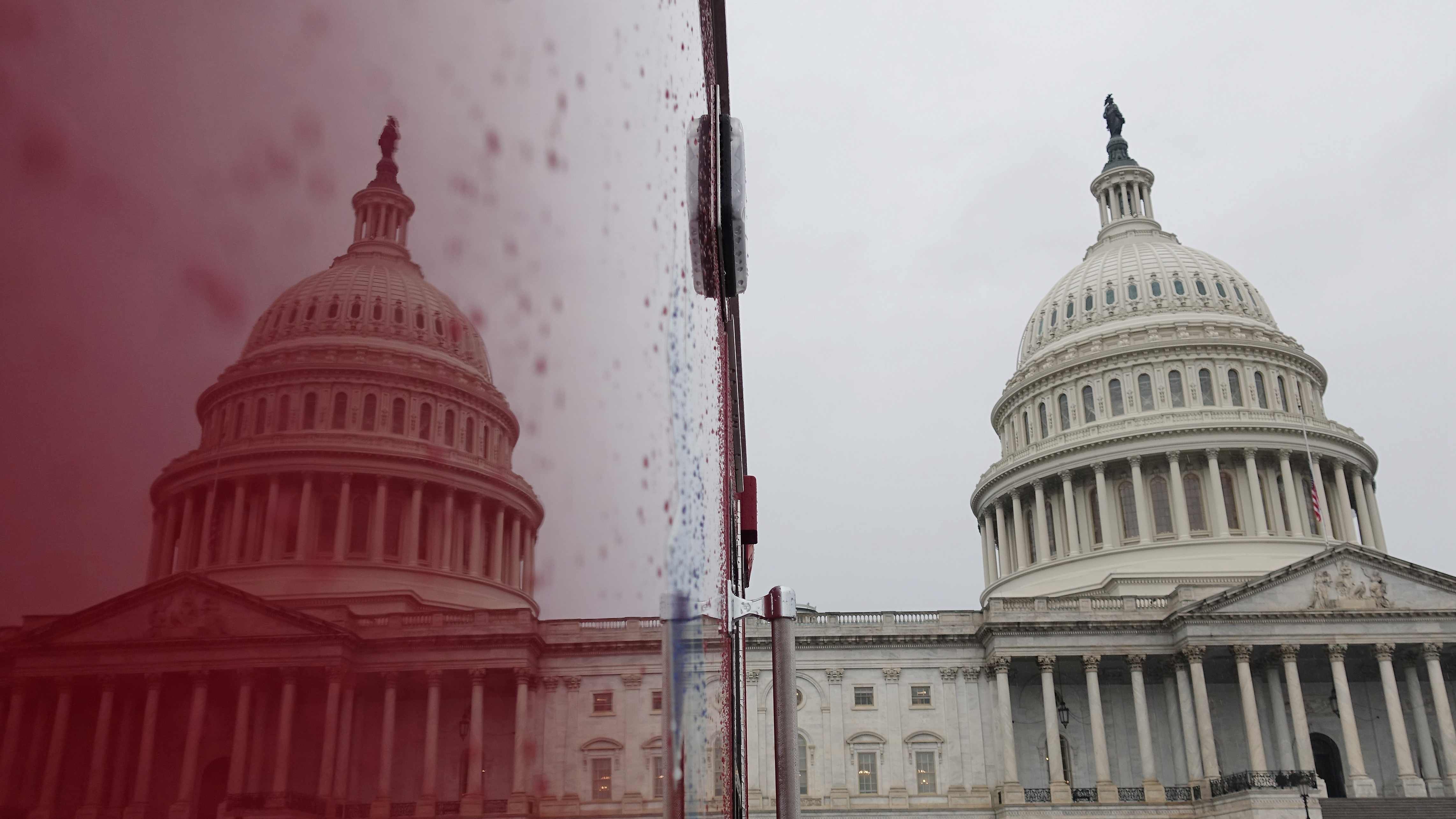
The flag of the United States and the Statue of Liberty seen in New York City. /CFP
The flag of the United States and the Statue of Liberty seen in New York City. /CFP
Editor's note: Radhika Desai is a professor of political studies at the University of Manitoba in Canada. The article reflects the author's opinions and not necessarily the views of CGTN.
President Biden has promised a Summit of Democracies during his first year in office. It will aim to shift his China policy from inconvenient trade disruptions to the high-minded plane of democracy and human rights, rope in the US allies to bolster an otherwise weakening effort and weaponized democracy in a new way. It will no longer be just a pretext for military actions abroad but also make the defence of democracy at home – against 'Russian interference,' 'Chinese propaganda' and the like – a security issue. Expect bonanzas for the military-industrial complex, particularly its information/disinformation technology companies.
The idea could not have been worse timed: U.S. democracy's fortunes, sinking for decades now, have sunk to a new low, as the Black Lives Matter protests, the demeaning 2020 U.S. elections, the contestation of its results and the invasion of the Capitol Hill show. No wonder we read in The New York Times that many in Biden's own administration would prefer to 'hold a democracy summit at home - one focused on "injustice and inequality" in the United States, including issues like voting rights and disinformation.'
The decay of U.S. democracy is easily outlined. Abraham Lincoln famously defined Democracy as the "rule of the people, by the people and for the people." How well does U.S. democracy fare by these three standards?
Is U.S. democracy the rule of the people? Wealthy and credentialed elite dominates U.S. elected institutions. A majority of the current Congress members are millionaires and are led by the richest among them. Considering the wealth of many long-serving members, serving in Congress can be lucrative. No wonder resentment against the U.S. political establishment seethed over and carried Trump to the White House.

Supporters of then U.S. President Donald Trump storm the U.S. Capitol complex in Washington, D.C., U.S., January 6, 2021. /Reuters
Supporters of then U.S. President Donald Trump storm the U.S. Capitol complex in Washington, D.C., U.S., January 6, 2021. /Reuters
Congress may be getting more socially diverse with more female and non-white members. However, not only does it remain far short of being truly representative of the U.S. electorate, its female and non-white members also hail from the same wealthy and credentialed classes. Such a political class is plutocratic, not democratic.
U.S. democracy is a rule of the people only in a darkly ironic sense. It is the rule of ordinary people by a wealthy, miserly and punitive elite. Its policies create a financialized rentier economy that benefits the tiny elite they serve - the 1 percent as Occupy Wall Street had it - in exchange for the privilege of being part of the 10 percent. Everyone else suffers stagnant wages, ever more precarious and scarce employment, deteriorating public services, gutted public education, dimming prospects …. the list is long. The inevitable social deviance and protest face militarized police armed to the teeth.
Is U.S. democracy based on rule by the people? The universal adult franchise may exist, but it is recent and precarious. Jim Crow laws prevented the formal enfranchisement of African Americans in the South until 1965 and their effective enfranchisement well into the 1970s, precisely the years when the U.S. posed as the leader of the 'free world.' Since then, neoliberal policies have created and entrenched new divisions of racialized class which pervasive voter apathy and suppression keep in place.

The reflection of the U.S. Capitol building on an ambulance's door in Washington D.C., the United States. /Xinhua
The reflection of the U.S. Capitol building on an ambulance's door in Washington D.C., the United States. /Xinhua
Moreover, these formally democratic arrangements tell us little about how U.S. elections really work. Their toxic combination of polling, advertising and the media spins the truth mind-bogglingly. That requires astronomical sums that campaign-financing rules permit candidates to raise from the U.S. wealthiest. Since 1960, every president except Trump has won elections by outspending his rivals. At about $14 bn, the 2020 elections were twice as costly as 2016 and Biden won them narrowly by outspending Trump by a ratio of about 2:1. Elections have been reduced to an exercise through which the wealthy buy the next government.
As for 'democracy for the people,' the cross-party consensus on neoliberalism – with Republican neoliberalism cutting taxes for the rich and Democratic neoliberalism inventing new ways for their enrichment, such as Obamacare – is Exhibit A in demonstrating that U.S. democracy does not work for the people. These policies have, over the past forty years, created an economy of despair for the ordinary people.
With economic inequality, social and political division have also become entrenched. U.S. Marxist, Mike Davis argued in analyzing the 2020 U.S. election that before the onset of neoliberalism, electoral contests in the U.S. were like 'World War Two, with a high level of mobility and rapid gains and losses of large swaths of territory.' Forty years of neoliberalism have turned them into something more like 'World War One, with a single, mostly immobile line of battle and endless trench warfare.' In conducting such warfare, the two parties become indebted to the narrowest niche groups and the result is a legislative logjam.
Rather than dreaming of leading any Summit of Democracies, President Biden would do well to reflect on the pile of decay over which his office sits and listen to those who ask, "How can the United States spread democracy or act as an example for others if it barely has a functioning democracy at home?". Physician, heal thyself!
(If you want to contribute and have specific expertise, please contact us at opinions@cgtn.com.)

